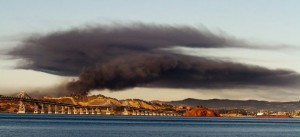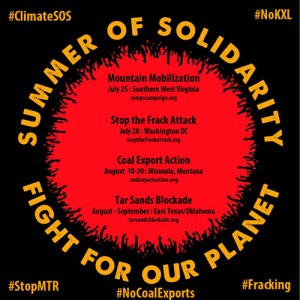 Last night, a massive Chevron oil fire sent toxic plumes of smoke into the skies of the San Francisco Bay area, sending thousands in nearby communities indoors to seek shelter. Residents of Richmond, where the refinery sits, expressed frustration and concern over the incident to television news and cited numerous similar events in the refinery’s history and can be found in the True Cost of Chevron Report.
Last night, a massive Chevron oil fire sent toxic plumes of smoke into the skies of the San Francisco Bay area, sending thousands in nearby communities indoors to seek shelter. Residents of Richmond, where the refinery sits, expressed frustration and concern over the incident to television news and cited numerous similar events in the refinery’s history and can be found in the True Cost of Chevron Report.
Reminiscent of its reckless operations around the world, Chevron continues to rake in billions in profits each year, while wrecking havoc on the planet, our climate and our communities. From the Niger Delta to Angola and from offshore in Brazil to the oil soaked rainforests of Ecuador; Chevron leaves a toxic trail as its legacy wherever it operates.
What’s worse, Chevron does not come clean about its culpability and understates the true cost of its operations. In a prepared statement about last night’s fires, Chevron clarified that “all employees were safely accounted for and there are no injuries.” Yet at least one Chevron staff received medical treatment and local area hospitals reported treating nearly 400 people for breathing problems and other issues. To top things off, the company also absolved any responsibility for notifying communities facing imminent danger and delayed in reporting the incident by as much as an hour.
In Richmond, the Communities for a Better Environment are organizing, both by turning out for a forum tonight to ask tough questions of Chevron representatives and as an ongoing campaign for improved public health and corporate responsibility.
 The fires came in the heat of an historic summer for climate change, filled with unprecedented blistering temperatures and erratic storm activity, and a determined resistance to a future of climate chaos. During these hot months, inspiring actions have burst from communities concerned with big fossil fuels like coal, oil and gas.
The fires came in the heat of an historic summer for climate change, filled with unprecedented blistering temperatures and erratic storm activity, and a determined resistance to a future of climate chaos. During these hot months, inspiring actions have burst from communities concerned with big fossil fuels like coal, oil and gas.
The Summer of Solidarity: Direct Action Against Extraction launched in Appalachia last week will continue throughout the next month, with Coal Export Actions in Montana next week and along the Keystone Pipeline in Texas. To participate in these actions and to push forward the transition to cleaner, renewable energy, sign up to receive RAN’s alerts.